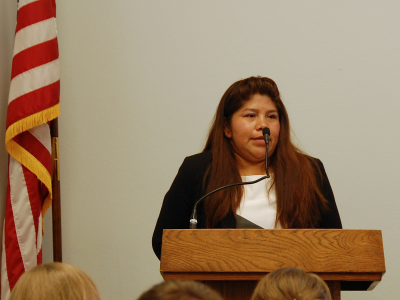A congressional briefing last Friday on Capitol Hill highlighted many reasons why American companies should be required to disclose if their products are manufactured by slaves or with slavery-tainted raw materials.
“Government can help, without being in the knickers of business too much, to encourage transparency,” said Mark Lagon, who is an international affairs professor at Georgetown University.
Lagon, who moderated the session, began the briefing by expressing support for federal regulations to require large publicly-held companies to report annually on slavery in their product supply chains.
“I’m a Republican,” Lagon said, and “this is the kind of formula…that makes the most sense in my mind.” Ambassador Lagon is the former Bush-appointed director of the State Department’s anti-trafficking office.
Lagon said that businesses not only have a “moral duty” to eliminate slavery from consumer products, they also have “a great interest in sussing it out. “
Bennett Freeman of Calvert Investments told the briefing that companies who use slaves are running legal risks that investors should know about.
“We have a particular perspective as investors,” Freeman said, a “hard-headed sense of investment risk. We simply do not want to invest in companies that knowingly are complicit, however indirectly, in human trafficking.”
Freeman represents Calvert’s portfolio of socially-responsible investment funds. He noted that states like California are already taking steps to require corporate disclosure, and it’s important for Congress to create a level regulatory playing field throughout the U.S.
“We do support legislation at the federal level to have uniformity,” he said.
FTS Programs Director Karen Stauss has been instrumental in advocating for a federal corporate transparency bill. Congresswoman Carolyn Maloney intends to introduce legislation requiring corporate disclosures this fall.

Slavery Survivor Flor Molina speaking on Capitol Hill
Corporate transparency “ends up being good for the company,” Stauss said at Friday’s briefing, noting that several firms have begun to investigate and remove slavery from their supply chains in eastern Congo. “They are being lauded loudly and publicly,” she said.
The most moving part of the briefing came when Flor Molina spoke. She was trafficked from Mexico to the garment sweatshops of Los Angeles. She had been lured by offers of a good job that would allow her to send money home to support her children. “When I arrived in Los Angeles,” she said, “I realized everything was a lie.”
Molina was punched and humiliated in front of other workers to keep her in line. She was told that nobody would help her if she tried to escape. “Even cows have more rights in this country than I have,” she recalls being told by her trafficker.
Molina did escape and is now a leading figure in California’s anti-trafficking movement.
“I think it’s important to implement laws,” she said. “If there were laws…that made companies responsible for their supply chain, I wouldn’t have fallen into trafficking.”
See more photos of the briefing here.



